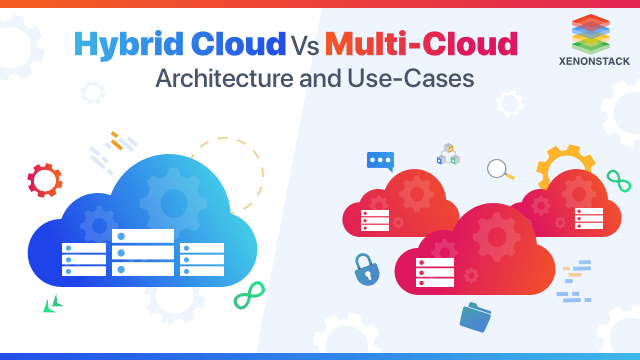
In today’s rapidly evolving digital landscape, businesses are leveraging cloud computing to drive innovation, scalability, and efficiency. Among the various cloud strategies, multi-cloud and hybrid cloud have emerged as prominent choices. While both approaches offer unique advantages, they also come with their own set of challenges. This blog delves into the benefits, challenges, and use cases of multi-cloud and hybrid cloud environments to help you make an informed decision.
Understanding Multi-Cloud and Hybrid Cloud
Multi-Cloud
Multi-cloud refers to the use of multiple cloud services from different providers, such as AWS, Google Cloud, and Azure. This approach allows organizations to leverage the strengths of each provider and avoid vendor lock-in.
Hybrid Cloud
Hybrid cloud, on the other hand, combines private and public clouds to create a unified, flexible, and agile computing environment. It allows data and applications to be shared between both cloud types, offering greater control over data and resources.
Benefits of Multi-Cloud
1. Avoid Vendor Lock-In
By utilizing multiple cloud providers, organizations can avoid being dependent on a single vendor. This flexibility allows businesses to negotiate better terms and switch providers if needed without significant disruption.
2. Optimized Performance
Different cloud providers excel in different areas. For instance, one might offer superior AI and machine learning capabilities, while another provides better data storage options. Multi-cloud allows businesses to choose the best services for their specific needs, optimizing overall performance.
3. Increased Reliability and Redundancy
Using multiple cloud providers can enhance reliability and redundancy. If one provider experiences an outage, workloads can be shifted to another provider, ensuring continuous operation and minimizing downtime.
4. Cost Management
Multi-cloud strategies enable organizations to optimize costs by leveraging the most cost-effective services for different workloads. This approach can result in significant savings, especially for large-scale operations.
Challenges of Multi-Cloud
1. Complexity
Managing multiple cloud environments can be complex and requires specialized skills and tools. Organizations need to invest in training and resources to effectively manage and integrate these environments.
2. Security Risks
Multi-cloud environments can introduce security risks, as data is distributed across multiple platforms. Ensuring consistent security policies and compliance across all providers can be challenging.
3. Integration Issues
Integrating applications and data across multiple cloud providers can be difficult. Organizations need to ensure that their systems can communicate and work seamlessly together.
Benefits of Hybrid Cloud
1. Flexibility and Scalability
Hybrid cloud offers the best of both worlds by combining the control and security of private clouds with the flexibility and scalability of public clouds. This approach allows organizations to scale their infrastructure as needed while maintaining control over sensitive data.
2. Enhanced Security and Compliance
By keeping sensitive data on private clouds and leveraging public clouds for less sensitive workloads, organizations can enhance security and ensure compliance with regulatory requirements.
3. Cost Efficiency
Hybrid cloud allows businesses to optimize costs by using public clouds for peak workloads and private clouds for steady-state operations. This approach can result in significant cost savings.
4. Improved Business Continuity
Hybrid cloud can enhance business continuity by providing backup and disaster recovery options. Data can be replicated across private and public clouds, ensuring availability in case of an outage.
Challenges of Hybrid Cloud
1. Complexity in Management
Managing a hybrid cloud environment can be complex, as it requires coordinating between private and public clouds. Organizations need robust management tools and strategies to effectively oversee these environments.
2. Integration Challenges
Integrating private and public clouds can be challenging, especially if they are from different providers. Ensuring seamless interoperability and data flow between clouds is crucial for a successful hybrid cloud strategy.
3. Security Concerns
While hybrid cloud can enhance security, it also introduces risks. Organizations need to implement stringent security measures and policies to protect data across both private and public clouds.
Use Cases for Multi-Cloud
1. Disaster Recovery
Multi-cloud is ideal for disaster recovery. By replicating data across multiple cloud providers, organizations can ensure data availability and business continuity in case of an outage or disaster.
2. Geographic Redundancy
Organizations with a global presence can benefit from multi-cloud by deploying workloads across different geographic regions. This approach reduces latency and ensures compliance with local data regulations.
3. Optimized Workloads
Businesses can optimize workloads by leveraging the strengths of different cloud providers. For example, using one provider for AI and machine learning tasks and another for data storage and analytics.
Use Cases for Hybrid Cloud
1. Data Sensitivity and Compliance
Hybrid cloud is ideal for organizations with sensitive data that need to comply with regulatory requirements. By keeping sensitive data on private clouds and using public clouds for other workloads, businesses can ensure compliance and security.
2. Legacy Applications
Organizations with legacy applications that cannot be easily migrated to the cloud can benefit from a hybrid cloud approach. They can keep these applications on private clouds while leveraging public clouds for new applications and services.
3. Seasonal Workloads
Businesses with seasonal workloads can use hybrid cloud to scale their infrastructure during peak times. By leveraging public clouds for additional capacity, they can manage costs effectively and ensure performance.
Conclusion
Both multi-cloud and hybrid cloud strategies offer unique benefits and challenges. Multi-cloud provides flexibility, optimized performance, and redundancy, but requires careful management and security considerations. Hybrid cloud offers flexibility, enhanced security, and cost efficiency, but can be complex to manage and integrate.
At Clarusto, we specialize in helping businesses navigate the complexities of cloud migration and management. Whether you’re considering a multi-cloud or hybrid cloud strategy, our expert team can provide the guidance and support you need to succeed. Contact us today to learn more about how we can help you leverage the power of the cloud to drive your business forward.
